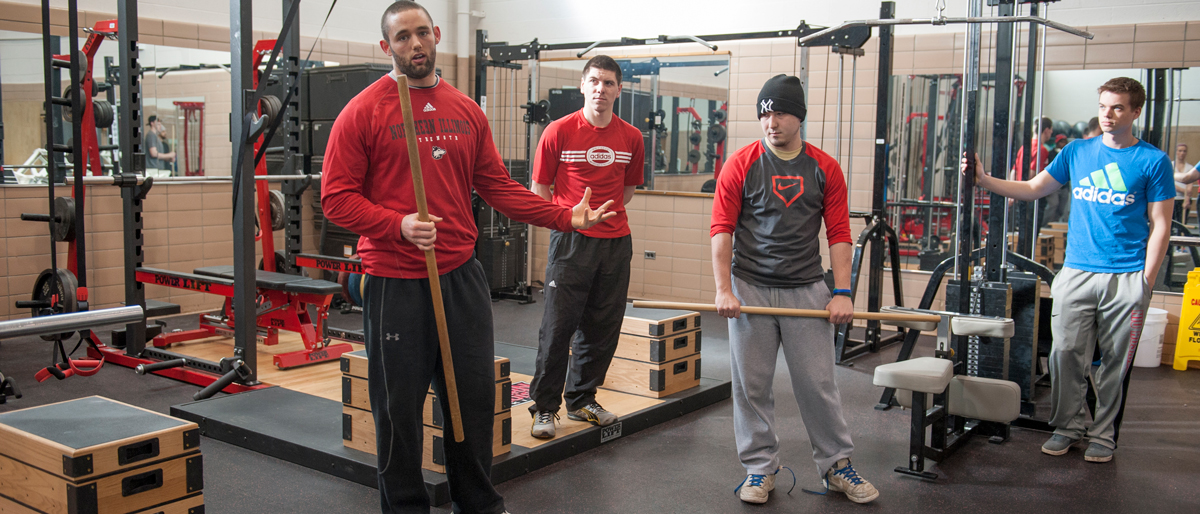- Department of Kinesiology and Physical Education
- Academic Programs
- M.S. in Kinesiology and Physical Education

M.S. in Kinesiology and Physical Education
Lifelong physical activity is a critical pursuit – and one that requires knowledgeable people who research and implement evidence-based practices for students and clients. Our M.S. in Kinesiology and Physical Education, with thesis and non-thesis options, prepares you to work as a competent and reflective professional in the exercise science and physical education teacher education communities. You'll choose from three specialties: exercise physiology, physical educational pedagogy or sport and exercise psychology. We offer outstanding instruction with state-of-the-art equipment to ensure your success and professional growth. You'll also have multiple opportunities to engage with graduate faculty on research projects, grant-writing and community outreach.
Choose Your Specialization
- Exercise Physiology This specialization provides knowledge and skills to students in the area of exercise physiology. Students with such a professional background are prepared to assume various roles related to exercise physiology: research, teaching and applied/practical/laboratory positions in hospitals, corporations and health clubs. Applied exercise physiology and a human anatomy and physiology course are prerequisites for this specialization.
- Physical Education Pedagogy This specialization provides relevant theoretical knowledge and experience in contemporary best practices in the discipline of physical education including methodology/instructional strategies, supervision, program development and the use of technology and assessment in educational settings. Individuals completing this specialization will be able to assume leadership roles in pedagogy and curriculum development in physical education and related fields. In consultation with an adviser, the student selects either a thesis or non-thesis option. Students are strongly encouraged to concurrently pursue our certificate of graduate study in adapted physical education.
- Sport and Exercise Psychology This specialization focuses on relevant theory, research and practice in the areas of sport and exercise psychology. The coursework will help students examine a variety of predictors and consequences of sport and exercise participation. Emphasis is placed on the application of knowledge grounded in theory and research. Specifically, teachers, coaches and exercise professionals will experience a theory-to-practice approach to addressing the psychological needs of their participants in a performance setting.
Our specialization in Sport and Exercise Psychology is ranked by Sports Degrees Online.
You’ll need a bachelor’s which included courses in kinesiology, physical education, health, recreation or equivalent courses. You’ll also need to provide your college transcripts.
During your program of study, you will:
- Utilize oral communication to effectively communicate their knowledge to fellow professionals and lay-persons.
- Utilize written communication to effectively communicate their knowledge to fellow professionals and lay-persons.
- Utilize technology effectively and appropriately as required in their area of specialization.
- Utilize critical thinking skills to analyze, synthesize and evaluate relevant material within their area of specialization.
- To further blend the classroom and the "real-world," the College of Education’s Educate and Engage series provides opportunities for students to engage in local, national and international experiences.
- Graduate assistantships are available if you want to study full-time and gain pre-professional experience.
- We boast a strong international presence and enjoy research collaborations, workshops and exchanges with countries such as Belize, Brazil, Canada, China, Columbia, Finland, Germany, New Zealand, Spain, Sri Lanka, Sweden and Turkey.
- Our programs are accredited to ensure the highest level of education. We are accredited by, or are a member of, the Commission on Accreditation of Athletic Training Education, the National Strength and Conditioning Association’s Education Recognition Program and the American Kinesiology Association.
Non-thesis Option (30)
Research Core (6)
- KNPE 552: Methods of Research in Kinesiology and Physical Education (3)
- KNPE 645: Application of Statistics to Research in Kinesiology and Physical Education (3)
Specialization Core (15)
15 semester hours in selected specialization, which can include course such as:
- KNPE 515 - Advanced Laboratory Techniques in Exercise Physiology Credits: 3
- KNPE 560 - Cardiorespiratory Physiology: Responses and Adaptations to Exercise Credits: 3
- KNPE 561 - Advanced Exercise Physiology Credits: 3
- KNPE 635 - Biomechanics Credits: 3
- KNPE 652 - Exercise Bioenergetics Credits: 3
- KNPE 577 - Physical Education in the Elementary School Credits: 3
- KNPE 578 - Seminar in Motor Development Credits: 3
- KNPE 620 - Seminar in Physical Education Curriculum Credits: 3
- KNPE 582 - Psychology of Sport and Exercise Credits: 3
- KNPE 583 - Applied Sport Psychology Credits: 3
- KNPE 586 - Sport in Society Credits: 3
Select one of the following (3)
Three semester hours of additional KNPE coursework.
Other coursework
Electives with approval of graduate program adviser (6).
Thesis Option (30)
Same requirements as listed above except in lieu of six credit hours of elective work, students take six (6) semester hours of KNPE 699A: Master’s Thesis.
-
Academic Programs
- Athletic Training (M.S.A.T.)
-
Kinesiology (B.S.)
-
Sport Management (B.S.)
-
Physical Education (B.S.Ed.)
-
Accelerated B.S in Kinesiology/M.S. in Athletic Training
-
Accelerated B.S./M.S. in Sport Management
-
Kinesiology and Physical Education (M.S.)
- Sport Management (M.S.)
-
Kinesiology and Physical Education (Ph.D.)
Contact Us
Department of Kinesiology and Physical Education
Anderson Hall 221
DeKalb, IL 60115
P: 815-753-1407
F: 815-753-1413
knpe@niu.edu